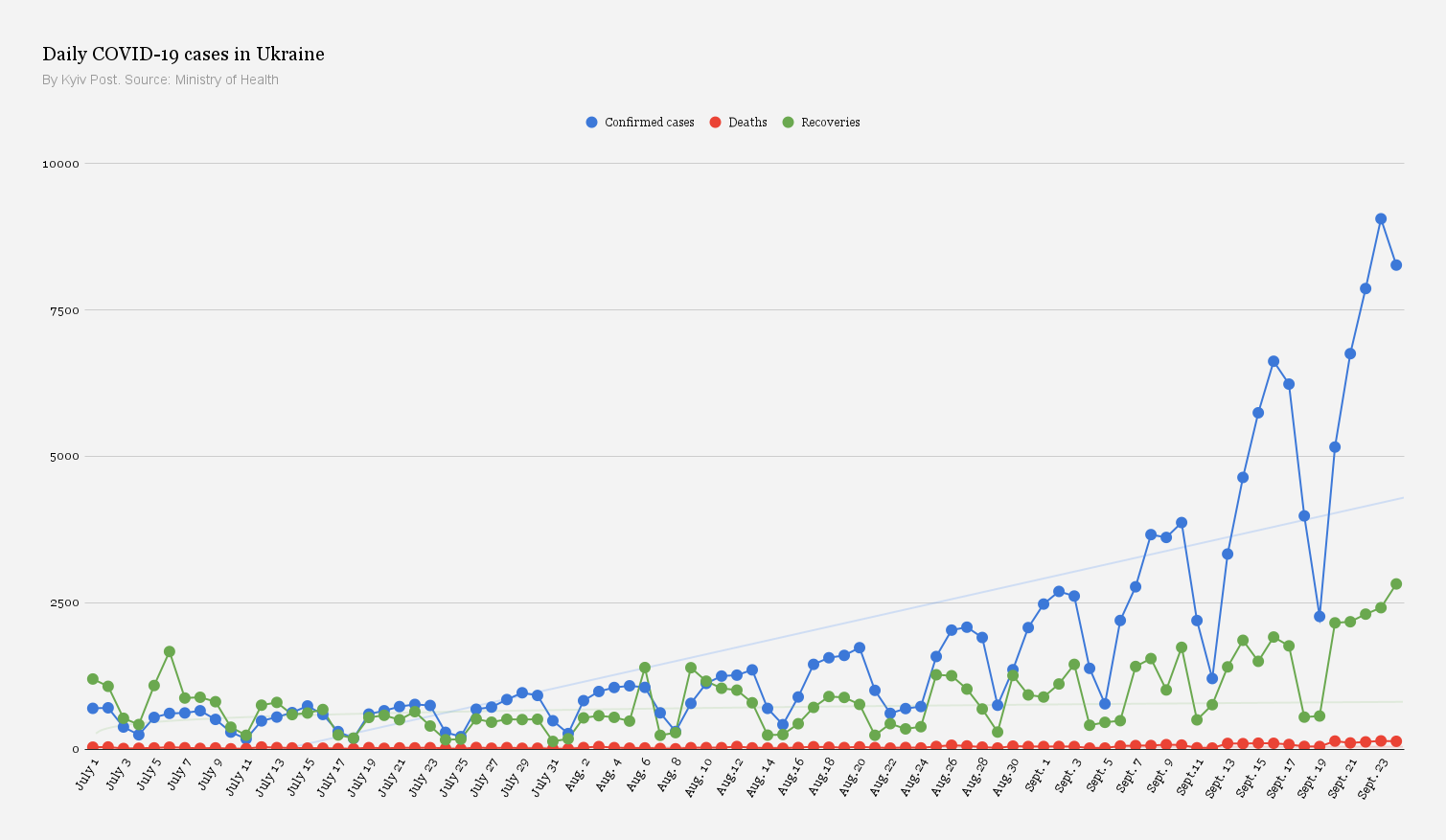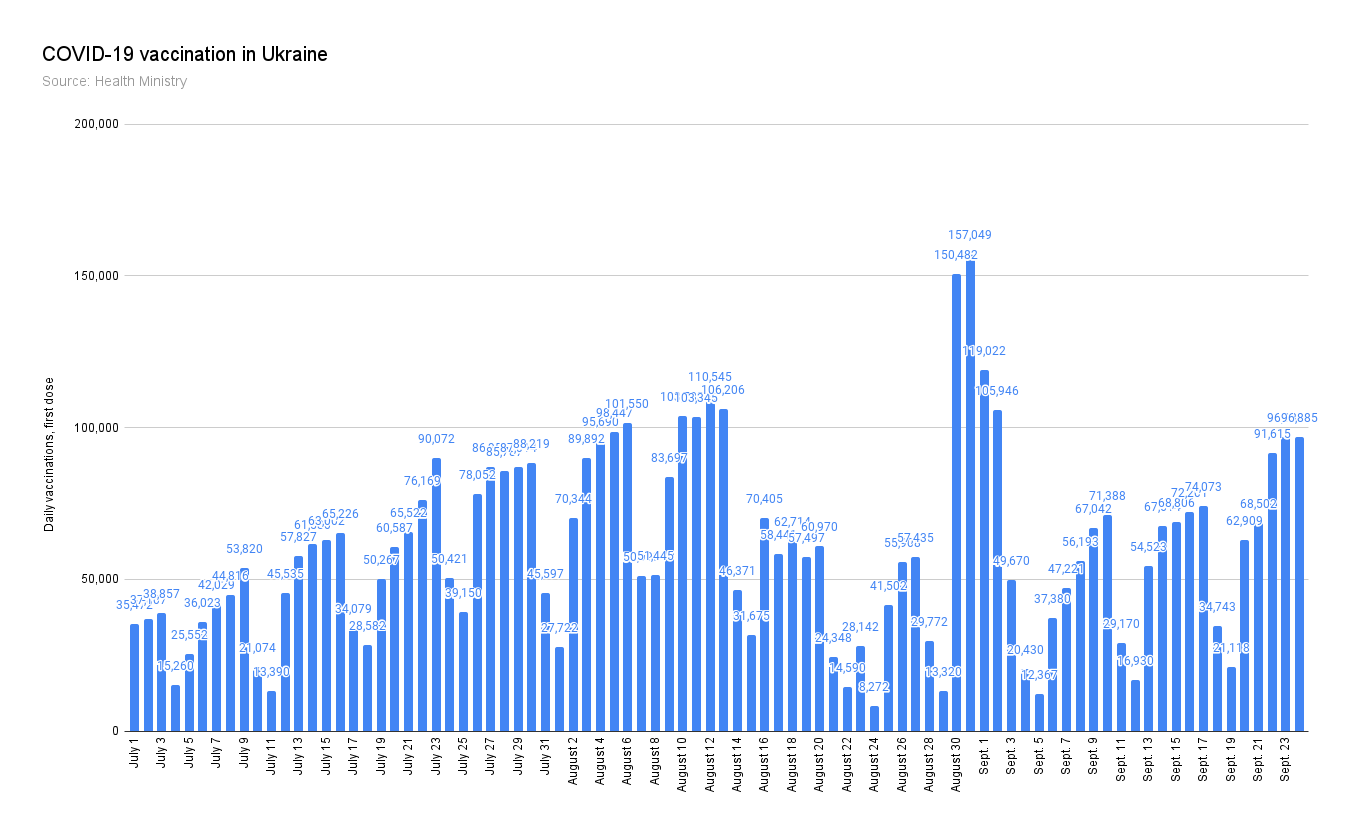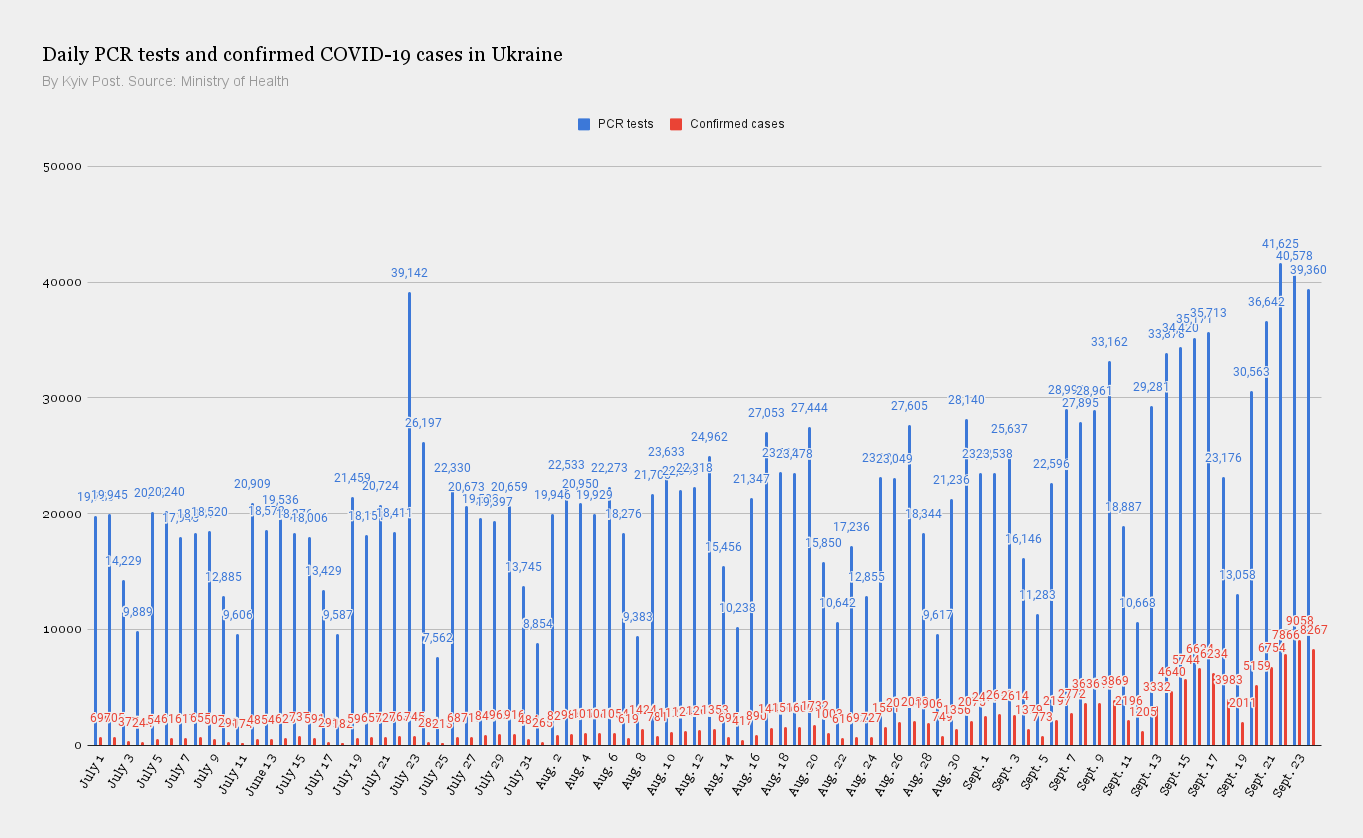Ukraine has registered 8,267 new cases of COVID-19 as of 9 a.m. on Sept. 25. The total number of cases in the country since the start of the pandemic is over 2.37 million.
In the past 24 hours, 2,821 COVID-19 patients have recovered and 133 have died.
More than 2.24 million people have recovered from COVID-19 and 55,557 have died since the pandemic hit Ukraine.
In the past 24 hours, Ukrainian laboratories have carried out 39,360 polymerase chain reaction (PCR) tests and 10,699 antibody tests. Over 12.6 million PCR tests have been conducted since the start of the pandemic.
The largest numbers of new cases have been recorded in Kharkiv Oblast (929), Dnipropetrovsk Oblast (751), Lviv Oblast (677), Zaporizhia Oblast (556), and Donetsk Oblast (503).

Ukraine’s daily COVID-19 cases, deaths, and recoveries from July 1, 2021, to Sept. 23, 2021. (Kyiv Post)
State of vaccination
As of Sept. 24, more than 5.4 million Ukrainians are fully vaccinated against COVID-19, and additionally, over 1.26 million people have received the first of the two doses. The vaccination campaign started on Feb. 24.
In the last 24 hours, 96,885 people received their first dose of vaccine, while 62,119 received the second dose, completing their vaccination.

Ukraine’s daily COVID-19 vaccinations from July 1 2021 to Sept. 24, 2021. All data was released by the Ministry of Health.
Minister of Health Viktor Lyashko has announced that the fifth and final stage of COVID-19 vaccination in Ukraine began on July 21. This means that all willing adults are now able to get a jab.
Ukraine’s Ministry of Health also now allows voluntary COVID-19 vaccination of children over the age of 12 with the Pfizer-BioNTech vaccine, starting July 30.
Children over 12 can get the Pfizer vaccine if they have a high risk of severe disease related to COVID-19, are traveling abroad where the vaccine is mandatory or have already received the first dose of Pfizer in another country.
Ukraine currently vaccinates its people with Pfizer, Sinovac, Moderna and AstraZeneca vaccines. On July 5, Ukraine authorized the Johnson & Johnson vaccine for use.
On July 21, Kyiv’s primary mass vaccination center started offering Moderna and Pfizer vaccines to everyone, as well as CoronaVac.
The Ministry of Health and the International Bank for Reconstruction and Development (World Bank) signed a $90 million agreement to launch the COVID-19 Emergency Response and Vaccination in Ukraine project.
Some $40 million are to be used to purchase vaccines, $30 million will be allocated for the deployment of vaccination against COVID-19, with the remaining funds used to strengthen the capacity of testing for COVID-19.
The U.S. has also promised to give Ukraine some of the 500 million doses of the Pfizer vaccine that it plans to donate to poor countries. Earlier, the U.S. said it would give Ukraine a share of 25 million doses pledged in humanitarian aid.
Ukraine was waiting for 1.5 million doses of AstraZeneca and 10 million doses of Novavax. However, the Serum Institute was not able to export the promised vials due to a dire local situation. Thus Ukraine has suspended its contract with the Indian vaccine manufacturer.

Ukraine’s daily new COVID-19 cases and polymerase chain reaction (PCR) tests, the most accurate way of diagnosing the novel coronavirus, between July 1, 2021 and Sept. 24, 2021. All data was released by the Ministry of Health.
Quarantine restrictions
On Sept. 20, Ukraine extended its COVID-19 adaptive quarantine until Dec. 31. On Sept. 23, the government tightened the restrictions and the country move to the yellow zone.
Ukraine color-codes oblasts green, yellow, orange or red, depending on the severity of the outbreak there.
The yellow zone restrictions require restaurants, cinemas, gyms and cultural institutions to operate with lower capacity. However, this will not apply to places where owners or event organizers allow only visitors vaccinated with at least one dose or those who had tested negative for COVID-19 in the past 72 hours.
Under the yellow zone restrictions, mass sporting and cultural events can only be held if the venue is two-thirds occupied or if there is no more than one attendant per four square meters.
Cinemas and other cultural institutions must not exceed two-thirds capacity or one-half capacity for each hall or theater.
Only four people can sit at a single table in restaurants or cafes, and the distance between the tables has to be at least 1.5 meters.
Gyms and fitness centers must have no more than one visitor per 10 square meters.
Schools will be allowed to continue working in the yellow zone if 80% of their employees received at least one dose of vaccine.
Venue owners can get around the yellow zone restrictions if at least 80% of their visitors and staff have received at least one vaccine dose or tested negative for COVID-19 in the last 72 hours. Businesses may choose to turn away unvaccinated customers, according to the Cabinet of Ministers resolution, announced on Sept. 13.
People can prove their status by showing vaccination documents. These include a digital “green” certificate for people with both doses and a “yellow” one for people with only one dose. The certificates come in the form of a QR code in the Diia mobile app.
International vaccination certificates, prophylactic vaccination cards, and negative test results from a laboratory can also be used.
“Following the practice of European countries, as well as the United States, we propose to bring the quality of life of the vaccinated population against COVID-19 back to normal,” Health Minister Viktor Lyashko said on Sept.6.
Travel restrictions
Starting early August, Ukraine came back to asking everyone arriving in Ukraine — both foreigners and returning citizens — to take a COVID-19 test when entering the country to minimize the risk of spreading the most widespread coronavirus Delta variant.
The exceptions are vaccinated Ukrainians and foreigners with COVID-19 vaccine certificates. As of Aug. 18, only one shot is required to be able to skip PCR tests or self-isolation on arrival.
For travelers vaccinated with vaccines that haven’t been approved by the WHO, such as the ones from Russia and India, self-isolation will be mandatory if they stayed in either of those countries for more than seven days.
Travel restrictions should be checked on authorities’ websites prior to traveling.
